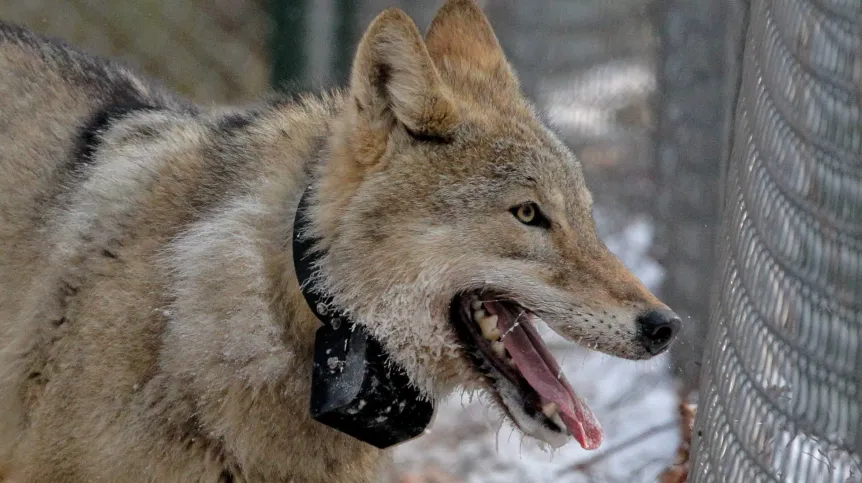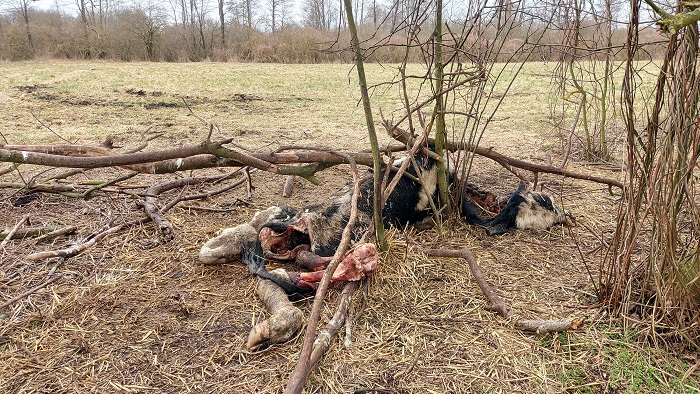
In addition to eating hunted deer and wild boars, wolves also feed on the carcasses of dead farm animals, illegally dumped on the edges of fields, into swamps and forests, which poses an epidemiological threat, shows research conducted with telemetry collars.
The team of Dr. Sabina Pierużek-Nowak from the Faculty of Biology of the University of Warsaw used data from collars worn by 19 wolves and analysed the content of over 1,000 wolf faeces from various areas. The researchers checked how wolves coped with environments transformed by humans.
Scientists have determined that the primary food of these predators are wild ungulates - both in forests and in the mosaic of forests, agricultural and urban areas. Wolves do not have to kill cattle or sheep to adapt to landscapes dominated by humans, because humans themselves provide them with the meat of dead pigs, cows, horses and even poultry from farms. Thanks to telemetry collars worn by wolves, scientists have revealed cases of illegal disposal of dead animals in forests. 'A significant problem in the use of this type of data remains the lack of appropriate response from the competent services,’ the researchers say.
LANDSCAPE OF FEAR. SHOULD WE BE AFRAID OF WOLVES?
'It was previously believed that through predation and shaping the so-called landscape of fear, wolves could influence the populations of wild ungulates in forest ecosystems. However, our research shows that this also happens in agrocenoses (simplified artificial ecosystems adapted to plant breeding - PAP),’ says Dr. Pierużek-Nowak.
The combination of analysis of the content of wolf faeces and telemetry research also allowed scientists to gain better insight into the problem of predators eating farm animals.
Until now, it was commonly assumed that the remains of cows, goats and sheep found in wolf faeces came from animals killed by predators. However, research shows that wolves largely use carcasses of animals that have been illegally dumped on the edges of fields, swamps and forests.
'We were amazed by the scale and commonality of this phenomenon throughout the country,’ says Dr. Pierużek-Nowak. 'We revealed cases of wolves feeding on shallowly buried pig carcasses and a pony carcass in the vicinity of the Roztocze National Park, and on the carcasses of adult cows and calves transported by tractors to the outskirts of fields and wetlands in Masovia, and even on the carcasses of turkeys and geese stored in the backs of industrial poultry farms on the western edge of the Noteć Forest and in Kashubia.'
The researcher clarifies that in all cases, the carcasses of farmed mammals and poultry ended up in the environment illegally, because as hazardous waste they should be disposed of by specialized companies.
SANITARY REGULATIONS ARE VIOLATED NOT ONLY IN POLAND
The first conclusions from research were presented during the international conference 'Wolves Across Borders', which took place in May in Sweden. The use of wild animals equipped with telemetry collars to detect violations of sanitary regulations was also described by scientists from the Iberian Peninsula.
The team led by Professor José López-Bao from the University of Oviedo equipped 21 griffon vultures and 13 wolves with GPS-GSM transmitters. Telemetry detected 486 carcasses of farm animals, on which both species fed. In the vast majority of cases, the storage of carrion turned out to be in violation of sanitary regulations. The results of this research were published in August in the Journal of Applied Ecology.

According to Spanish scientists, wild animals tracked using telemetry act as 'whistleblowers' thanks to which government agencies can obtain information regarding the illegal dumping of hazardous waste.
UNUSED INFORMATION FROM WOLF WHISTLEBLOWERS
However, a significant problem in the use of this type of data remains the lack of appropriate response from the appropriate services. 'We notified both veterinary services, including district veterinarians and voivodeship veterinary inspectorates, and environmental protection inspectorates about the detected irregularities, but their response was slow and ineffective,’ says Dr. Pierużek-Nowak.
Scientists emphasize that a decisive response to this type of threat is important due to epidemiological threats. 'The carcasses of farm animals may become a source of infections for other domestic and wild animals, as well as for humans. In the era of increasing threats from African swine fever, bird flu and other epizootics, prevention is an important weapon that must be used,’ biologists say.
The project 'From a forest inhabitant to a suburban dweller - wolf adaptations to human-dominated landscapes' led by Dr. Sabina Pierużek-Nowak is financed with a grant from the Polish National Science Centre.
PAP - Science in Poland
kol/ zan/ kap/
tr. RL













